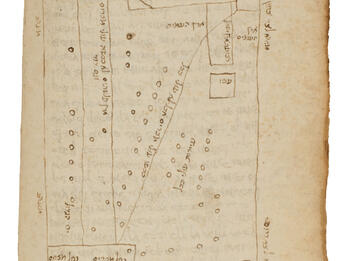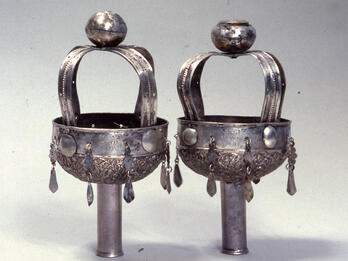Masa‘ot erets Yisra’el (Travels in the Land of Israel)
Safed is in the upper Galilee, in the Naftali region, with the bulk of the city atop the mountain. Surrounding the city’s mountain are some four mountains; on two of them, all the people are Ishmaelites, while on the other two, on all the slopes, the houses are Jewish. More than three hundred homeowners are found there. There are also three synagogues: one of Sephardim, one of Moriscos, and one of “Westerners,” which they call the synagogue of Elijah, because it is ancient, and they have a tradition that Elijah prayed there. The city is full of all kinds of goods and high-quality foods, such as grain, grape juice, and olive oil. There is a great abundance of these things, and they are inexpensive, depending upon the season. If it were not for the great amount of oil and produce taken from there to Damascus and other places, the products would cost nearly nothing. All kinds of fine fruits can be found there, and anything that is not there is brought from Damascus. The land is very abundant in terms of its merchandise, which include wool-clothing boutiques, dry-goods stores, and perfumeries, and there are many Jewish-owned enterprises in these industries. They bring dry goods and perfumes from Damascus, which they sell in the city. At the time when the galleys [Venetian warships] would go to Beirut to buy clothing and other things, there were also many Jews regularly pursuing business in the villages, trying to sell dry goods and all kinds of commodities. They would fill their houses with all varieties of goods. In addition, there is profit to be made in buying cotton, woven materials, wax, and scammony [a purgative plant used for medicinal purposes] when they are cheap, and then selling them at the right time. There are also Jews who sell fruits and vegetables, oil and cheese, and other such items in the market. One who wishes can sell grain, grape juice, and olive oil the whole year round. In general, the region is much more commercially lucrative than Italy, for the Ishmaelites are more willing to buy from Jews than from others.
One who does not have the capital to open a commercial enterprise will have to be a craftsman. Four types of crafts can be successfully taken up throughout the land of Israel: weavers, silversmiths, leather workers, and tanners. There are also builders. One who has the physical strength to be a daily worker can be paid well. Tailors can also earn their livelihood. However, one will not earn anything by offering services for teaching or for housekeeping, nor as a salesperson in a store. One cannot depend upon the community either, for there are many poor people. Therefore, one who lacks a craft or funds should not leave Italy, lest he regret his move and have to return. A hint is enough for the wise.
Now I will write about all the holy resting places of the righteous men and prophets, before whom I prostrated myself and prayed on their graves. Blessed be the Lord, who let me merit to do this! May He likewise let me merit to see the building of Ariel [the Temple], and may the Redeemer come to Zion. Amen, may God do so!
On Tuesday, the twenty-first of Marḥeshvan in the year 5282 [1522], I entered a house that was built on the grave of Hosea ben Be’eri. It is located at the end of the graves of Israel, outside of Safed. A Karaite teacher of Jewish law, from Damascus, built a beautiful and splendid chamber over it, and a candle burns continuously, funded by the charity of those who go to prostrate themselves there. Opposite is another closed cave; they say that his father Be’eri is buried inside.
I was also at En Zeitim, a village one mile from Safed. About forty Jewish homeowners live there, all Morisco, and the synagogue has twenty-six Torah scrolls. A short distance from the village is the holy grave of R. Judah bar Ila‘i, and his son, R. Yose. On the holy grave is an almond tree that has been dead for about three years. There is also a large field of olive trees, a tribute to the pious man, may his memory be for a blessing. It is related that a certain Ishmaelite woman climbed the tree over the grave in order to pick almonds, while other women told her to ask permission from the pious man. She cursed them and fell from the tree, and all her limbs broke, until she donated—in the name of this pious man—the gold bracelets on her wrists, with which she purchased olive trees. Others were dedicated later on, to the point that there are currently four hundred olive trees. The incident with this woman happened about sixty years ago.
On Thursday, the twenty-third, I rode to the village of Meron, a half a day’s ride from Safed. Halfway is a village named Kuymea [likely Kudita]. Next to it, on the road, is the grave of the son of R. Yose from Yokrat, whose father was punished for picking figs before they were ripe, as is mentioned in b. Ta‘anit [24a]. The Ishmaelites call it “El-mutaeatish.” Meron is a healthy and good place, with a spring of fine water, but no Jews live there. There I saw the cave of R. Simeon bar Yoḥai and his son, may they rest in peace. It is closed, and there is no room to enter. At the top of the cave, near the outside are two beautiful drawings of R. Simeon bar Yoḥai facing each other.
Credits
Moses Basola, “Masa‘ot erets Yisra’el (Travels in the Land of Israel)” (manuscript, Ancona, 1521–1523). Published as: Moses ben Mordecai Basola, Masa‛ot Erets-Yisra’el, ed. Itzhak Ben-Zvi (Jerusalem: Ha-ḥevrah ha-ʻivrit la-ḥakirat Erets-Yisra’el ve-‛atikoteha, 1938), pp. 42–47.
Published in: The Posen Library of Jewish Culture and Civilization, vol. 5.




